Botafogo de Futebol e Regatas
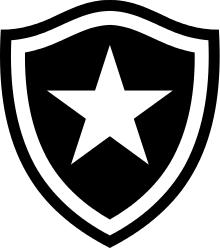 | ||||
| Full name | Botafogo de Futebol e Regatas | |||
|---|---|---|---|---|
| Nickname(s) |
Fogão (The Great Fire) A Estrela Solitária (The Lone Star) O Glorioso (The Glorious One) | |||
| Founded |
July 1, 1894, as a rowing club August 12, 1904, as a football club | |||
| Stadium | Estádio Olímpico João Havelange | |||
| Capacity | 17,250 | |||
| President | Carlos Eduardo Pereira | |||
| Head coach | Jair Ventura | |||
| League | Campeonato Brasileiro Série A | |||
| 2015 | Série B, 1st (promoted) | |||
| Website | Club home page | |||
|
| ||||
Botafogo de Futebol e Regatas (Portuguese pronunciation: [bɔtaˈfoɡu dʒi futʃiˈbɔw i ʁeˈɡataʃ]; Botafogo Football and Regatta), also known as Botafogo and familiarly as A Estrela Solitária (The Lone Star), is a Brazilian sports club based in Botafogo, Rio de Janeiro. Although they compete in a number of different sports, Botafogo is mostly known for its association football team. It plays in the Campeonato Carioca,[nb 1] the state of Rio de Janeiro's premier state league and the Brasileirão Série A. It was appointed by FIFA to the group of the biggest clubs in the twentieth century.[1]
In addition, the club has some of the top records of Brazilian football, as the largest number of unbeaten matches: 52 games between 1977 and 1978;[2] the matches unbeaten record in the Brazilian Championship games: 42, also between 1977 and 1978;[3] the largest number of players participations in total matches of the Brazil national football team (considering official and unofficial games): 1,094 participations[4] and the largest number of players assigned to the Brazilian national team for World Cup.[5] The club is still responsible for the greatest victory ever recorded in Brazilian football: 24-0 against Sport Club Mangueira in 1909.[6]
History
Formation and merger
On July 1, 1894, Club de Regatas Botafogo was founded.[7]
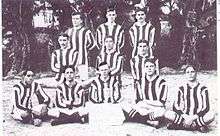
On August 12, 1904, another club was founded in the neighbourhood: the Electro Club, the name first given to the Botafogo Football Club. The idea came during an algebra lesson at Alfredo Gomes College, when Flávio Ramos wrote to his friend Emmanuel Sodré: "Itamar has a football club in Martins Ferreira Street. Let's establish another one, in Largo dos Leões, what do you think? We can speak to the Wernecks, to Arthur César, Vicente and Jacques". And so the Electro Club was founded. But this name wouldn't last. After a suggestion from Dona Chiquitota, Flávio's grandmother, the club finally became the Botafogo Football Club, on September 18 of the same year. The colours? Black and white., just like Juventus FC, the team of Itamar Tavares, one of the club's founders. And the badge, drawn by Basílio Vianna Jr., in Swiss style with the BFC monogram. The Botafogo Football Club would soon become one of the strongest football teams in Rio de Janeiro, winning the championships of 1907, 1910, 1912 and more.[8]
The same name, the same location, the same colours and the most important thing: the same supporters. It seemed that the destiny of both clubs was to become one. And so it happened: on December 8, 1942 they finally merged. It was after a basketball match between both clubs, when Botafogo Football Club player Armando Albano died suddenly, that the idea began to become truth. At the tragic occasion, the president of Club de Regatas Botafogo, Augusto Frederico Schmidt (also a major Brazilian poet) spoke: "At this time, I declare to Albano that his last match ended with the victory of his team. We won't play no longer the time left on the clock. We all want the young fighter to leave this great night as a winner. This is how we salute him". Eduardo Góis Trindade, Botafogo Football Club's president said: "Between the matches of our clubs, only one can be the winner: Botafogo!". And then Schmidt declared the fusion: "What else do we need to our clubs become one?". And so they did: Botafogo de Futebol e Regatas finally became true. The Football Club's badge became black, and the monogram substituted by Clube de Regatas' lone star.[9]
On the field
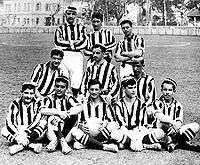
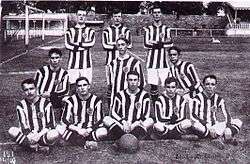
The team won the Campeonato Carioca in 1907, 1910 and 1912. In 1909 the team beat Mangueira 24–0, which remains the highest score in Brazilian football. They won further state titles in 1930, 1932, 1933, 1934 and 1935.[10]

In the 1940s, after the creation of "Botafogo de Futebol e Regatas", the best player of the team was Heleno de Freitas. However, Heleno did not win a championship for Botafogo. He scored 204 goals in 233 matches but went to Boca Juniors in 1948, the year Botafogo won its 9th state championship.
They won the Campeonato Carioca in 1957, 1961 and 1962, and in 1968 they won Serie A.[11]
1989 ended a period of 21 years without a title when the club won the state championship, retaining the trophy in 1990.[11]
In the 1990s, Botafogo won Copa Conmebol (the precursor of the current Copa Sudamericana)[12]
Botafogo would be relegated to the Second Division after ranking last in the Brazilian League of 2002. In 2003, Botafogo ranked second in Brazil's Second division (after Palmeiras) and returned to the First Division.
In 2006, the club won for the 18th time the Rio de Janeiro State Championship. Nowadays, Botafogo is the only club to win titles in three different centuries, including the state championship of rowing in 1899.
Stadium
.jpg)
Their home ground is the Estádio Olímpico João Havelange, which is known as the Estádio Nilton Santos for Botafogo matches.[13]
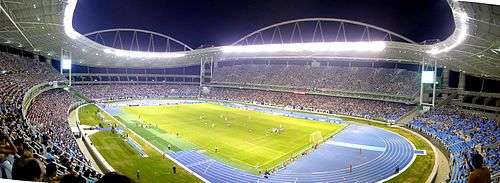
Rivals
Its biggest rivals are from the same city: Fluminense, Flamengo and Vasco da Gama.
Symbols

Lone Star
The Lone Star (Estrela Solitária) is currently present in Botafogo's flag and crest. This star was the principal symbol of Club de Regatas Botafogo. After the two Botafogos merged, the Lone Star became one of the most important symbols of Botafogo's football team.
Flag
The old flag of Club de Regatas Botafogo was white with a small black square which contained the Lone Star. The Football Club had a flag with nine black and white stripes with the club's crest localized in the center. Botafogo de Futebol e Regatas then based its flag on the two old clubs. The flag has five black and four white stripes, with a black square at the upper left side with the Lone Star.
Uniform
Their primary uniform consists of a black jersey with vertical white stripes, black shorts and grey socks. Their secondary uniform is all white. An all black uniform may also be used. The socks, although traditionally grey, may also be black or even white on rare occasions.
Mascots
In 1948 a stray dog named Biriba, known for urinating on the players, was the mascot that led them to the Campeonato Carioca.[14] For some time before the adoption of Manequinho as mascot, Botafogo had Donald Duck as their mascot, associated with the team fans' fiery temper (as well as, notoriously, 1940s idol Heleno de Freitas). Due to image rights problems with the Walt Disney Company, Donald did not become an official mascot.
Financial situation
In 2006 Botafogo had Supergasbras and Alê as sponsors, the arrangement during that year earned the team $3.2 million (R$7.2 million).[15] The next year, Botafogo managed to sign the sixth highest sponsorship deal in Brazil[16] the new sponsor Liquigás, a Petrobrás subsidiary paid the club $3.9 million (R$7.8 million) under the terms of the 1-year contract.[15] In 2008 not only the agreement with Liquigás was renewed for another year but it also became more lucrative since the sponsorship was raised to around $5 million (R$10.2 million).[17]
Botafogo generated in 2007 the 12th biggest revenue for all Brazilian Football clubs, that year's revenues totalled $20.8 million (or R$41.1 million) but Botafogo had a net loss of $1.9 million (or R$3.7 million).[18][19] Also at the end of 2007 Botafogo had total debts of $106.1 million (or R$209.7 million).[20]
Honours
International
- Runners-up: 1994
- 1963
Domestic
Regional
- 1962, 1964, 1966, 1998
- 1907, 1910, 1912, 1930, 1932, 1933, 1934, 1935*, 1948, 1957, 1961, 1962, 1967, 1968, 1989, 1990, 1997, 2006, 2010, 2013
- 1967, 1968, 1997, 2006, 2009, 2010, 2013, 2015
- Taça Rio: 9
- 1975, 1976, 1989, 1997, 2007, 2008, 2010, 2012, 2013
(*)The only to win four times in a row
Current squad
- As of 15 September 2016[22]
Note: Flags indicate national team as defined under FIFA eligibility rules. Players may hold more than one non-FIFA nationality.
|
|
Out of team
Note: Flags indicate national team as defined under FIFA eligibility rules. Players may hold more than one non-FIFA nationality.
|
|
Out on loan
Note: Flags indicate national team as defined under FIFA eligibility rules. Players may hold more than one non-FIFA nationality.
|
|
First-team staff
| Position | Name |
|---|---|
| Head coach | |
| Assistant coach | |
| Fitness coach | |
| Goalkeeping coach | |
| Medical staff |
Records
Golden Ball winners:

| Most appearances | |||||||||||||
| # | Name | Matches | Goals | Year | |||||||||
| 1. | 723 | 11 | 1948–64 | ||||||||||
| 2. | 612 | 243 | 1953–65 | ||||||||||
| 3. | 453 | 6 | 1967–76 | ||||||||||
| 4. | 444 | 306 | 1954–64 | ||||||||||
| 5. | 442 | 394* | 1959–68 | ||||||||||
| 6. | 442 | 15 | 1967–76 | ||||||||||
| 7. | 422 | 115 | 1940–54 | ||||||||||
| 8. | 413 | 186 | 1962–74, 1981 | ||||||||||
| 9. | 412 | 503* | 1993–02 | ||||||||||
| 10. | 387 | 4 | 1970–79 | ||||||||||
| 11. | 384 | 12 | 1946–57 | ||||||||||
| 12. | 371 | 2 | 1945–56 | ||||||||||
| 13. | 354 | 13 | 1987–90, 1994–96 | ||||||||||
| 14. | 352 | 154 | 1962–73 | ||||||||||
| 15. | 347 | 27 | 1955–62 | ||||||||||
| 16. | 340 | 116 | 1975–82 | ||||||||||
| * goalkeeper. | |||||||||||||
| Most goals | |||||||||||||
| # | Name | Goals | Matches | G/M | |||||||||
| 1. | 306 | 444 | 0,68 | ||||||||||
| 2. | 261 | 303 | 0,86 | ||||||||||
| 3. | 243 | 612 | 0,39 | ||||||||||
| 4. | 209 | 235 | 0,88 | ||||||||||
| 5. | 190 | 201 | 0,94 | ||||||||||
| 6. | 186 | 413 | 0,45 | ||||||||||
| 7. | 171 | 200 | 0,85 | ||||||||||
| 8. | 159 | 223 | 0,71 | ||||||||||
| 9. | 154 | 352 | 0,43 | ||||||||||
| 10. | 144 | 176 | 0,81 | ||||||||||
| 11. | 136 | 231 | 0,58 | ||||||||||
| 12. | 135 | 206 | 0,65 | ||||||||||
| 13. | 127 | 301 | 0,42 | ||||||||||
| 14. | 116 | 340 | 0,34 | ||||||||||
| 15. | 115 | 422 | 0,27 | ||||||||||
| 16. | 114 | 313 | 0,36 | ||||||||||
| 17. | 110 | 174 | 0,63 | ||||||||||
| 18. | 105 | 158 | 0,66 | ||||||||||
| 19. | 102 | 242 | 0,42 | ||||||||||
| 20. | 96 | 248 | 0,39 | ||||||||||
- Note: numbers don't count matches played in Torneio Início.
- Source: RSSSF Brasil – Botafogo
Managers
|
|
|
Notes
- ↑ Also known by its nickname Cariocão.
References
- ↑ "The FIFA Club of the Century" (PDF). FIFA. Retrieved 11 August 2016.
- ↑ "Botafogo 1x0 Flamengo - Jogo da invencibilidade (1979)". Rádio Botafogo. 18 July 2011. Retrieved 11 August 2016.
- ↑ "Botafogo é recordista de invencibilidade no futebol brasileiro". Fala Glorioso. 17 September 2014. Retrieved 27 July 2014.
- ↑ "Jogadores cedidos por clube na história da Seleção Brasileira". RSSSF Brasil. Retrieved 18 November 2015.
- ↑ "Copa: Botafogo segue líder entre clubes que mais cederam jogadores à Seleção". GloboEsporte.com. 7 May 2014. Retrieved 7 May 2014.
- ↑ "Maior goleada da história do futebol brasileiro completa um século". GloboEsporte.com. 25 May 2009. Retrieved 27 July 2014.
- ↑ "History". Botafogo de Futebol e Regatas. Retrieved 19 November 2013.
- ↑ "De como o Eletro Club tornou-se Botafogo". Gazeta Esportiva. Archived from the original on August 16, 2004. Retrieved 2007-10-07.
- ↑ "História – A união dos dois clubes fez nascer um dos times de maior tradição no Brasil". Botafogo de Futebol e Regatas official website. Archived from the original on August 6, 2007. Retrieved 2007-10-07.
- ↑ "Botafogo: Fogão flames burn eternal". Clubs. FIFA. Retrieved February 28, 2013.
- 1 2 "Botafogo FR: Trophies". Soccerway. Perform. Retrieved 16 May 2014.
- ↑ Rsssf.com
- ↑ "Botafogo FR". Soccerway. Perform. Retrieved 30 August 2015.
- ↑ "Maybe Brazil Needs a Pitch Invading Dog". www.theguardian.com. The Guardian. Retrieved 4 July 2014.
- 1 2 "Botafogo anuncia novo patrocínio nesta sexta – Terra – Rio de Janeiro". Esportes.terra.com.br. Retrieved 2010-05-15.
- ↑ "GloboEsporte.com > Futebol > Corinthians – NOTÍCIAS – Manga pertence 85% à Medial Saúde". Globoesporte.globo.com. 2008-01-24. Retrieved 2010-05-15.
- ↑ Gustavo Rotstein Do GLOBOESPORTE.COM, no Rio de Janeiro (2010-05-07). "GloboEsporte.com > Futebol > Botafogo – NOTÍCIAS – Clube pagará salários atrasados na próxima segunda". Globoesporte.globo.com. Retrieved 2010-05-15.
- ↑ "Clubes Brasileiros fecham 2007 no vermelho « Written World". Thewrittenworld.wordpress.com. 2008-07-18. Retrieved 2010-05-15.
- ↑ Archived December 28, 2008, at the Wayback Machine.
- ↑ GLOBOESPORTE.COM Rio de Janeiro (2010-05-07). "Globoesporte.com > Futebol – NOTÍCIAS – Brasileiros fecham 2007 no vermelho". Globoesporte.globo.com. Retrieved 2010-05-15.
- ↑ "CBF oficializa títulos nacionais de 1959 a 70 com homenagem a Pelé" (in Portuguese). Globo. December 22, 2010. Retrieved October 16, 2012.
- ↑ "footballzz.co.uk". footballzz.co.uk. 2010-09-19. Retrieved 2010-09-19.
External links
| Wikimedia Commons has media related to Botafogo de Futebol e Regatas. |
| Look up Botafogo in Wiktionary, the free dictionary. |